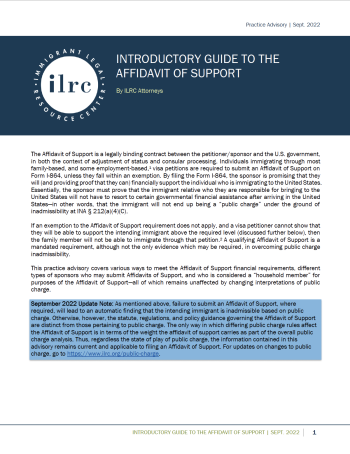The final step in the naturalization process is the oath of allegiance to the United States. The oath demonstrates loyalty to the United States and the Constitution. All applicants must demonstrate that they are “attached to the principles of the Constitution of the United States and well disposed to the good order and happiness of the United States.” The oath also includes statements that the applicant is willing to “bear arms on behalf of the United States,” and “perform noncombatant service in the Armed Forces” when required by law.

This advisory provides an introduction to the Affidavit of Support including various ways to meet the financial requirements, different types of sponsors who may submit Affidavits of Support, who is considered a “household member” for purposes of the Affidavit of Support, and exemptions to the Affidavit of Support.
In October 2017, the Department of Defense issued new policies that impact lawful permanent residents and other non-U.S. citizens in the military. This practice advisory discusses how these policies affect those who seek to enlist, and those who currently serve in the military, including in the Reserve Components. This practice advisory was jointly authored by the Immigrant Legal Resource Center, the National Immigration Forum, and the New Americans Campaign.
Immigration law has its own definition of what constitutes a criminal "conviction." Because most, although not all, immigration consequences require a conviction, if your client does not have a conviction the immigration case might be saved. This Advisory discusses which dispositions that come out of criminal court actually constitute a conviction for immigration purposes, and how to avoid a conviction. It has been updated to include the BIA's decision that a conviction on direct appeal of right does not have sufficient finality to be a conviction for immigration purposes.
In a time of increased immigration enforcement, advocates must consider all possible forms of relief for clients facing deportation. U nonimmigrant status (also frequently referred to as a “U visa”) is commonly pursued as an affirmative immigration benefit for undocumented individuals, but it may also be a particularly important form of removal defense for certain lawful permanent residents (LPRs) facing deportation, likely on the basis of criminal convictions. This Practice Advisory provides an introduction to U nonimmigrant status and details its benefits for LPRs facing deportation, as well as the particular issues LPRs may face in seeking this form of protection.
This advisory discusses the provisions of SB 54 (De Leon) and the California Values Act, relevant to criminal defense counsel who represent noncitizen clients. In addition to discussing specific provisions of the California Values Act, this advisory discusses how to incorporate this new law into your defense practice.
In the past four years, California voters and the California Legislature have created many new mechanisms for people to reclassify, vacate, and resentence offenses to eliminate the ongoing impact of criminal convictions. This advisory discusses how these new laws can benefit immigrants and can erase or mitigate certain criminal grounds of removability.
This advisory is a follow-up to the ILRC’s free webinar on hardship in waivers from the fall, 2017. Given the volume of questions received during the webinar and overall strong interest in this topic (over 1,000 people registered for this webinar!), this advisory covers the basics and also incorporates frequently asked questions. In this practice advisory you will find an overview of hardship in waivers: when you need to prove hardship, whose hardship counts, and what is hardship. It also covers tips and strategies for analyzing and proving “extreme hardship” in your case by using USCIS guidance, case law, and working closely with your client.
As of January 1, 2018, California has changed its “Deferred Entry of Judgment” program to a true “pretrial diversion” program. See Penal Code § 1000, amended by AB 208. Qualifying defendants charged with minor drug offenses can participate in pretrial diversion without incurring a drug conviction for immigration purposes. This Advisory will discuss how pretrial diversion works, and how to assist immigrants who went through the old Deferred Entry of Judgment.
This practice advisory is designed to introduce practitioners to the concept of Conditional Permanent Residence, and to explain the requirements and processes for removing the conditions on residence, thereby enabling the conditional resident to obtain Lawful Permanent Residence that can last indefinitely.